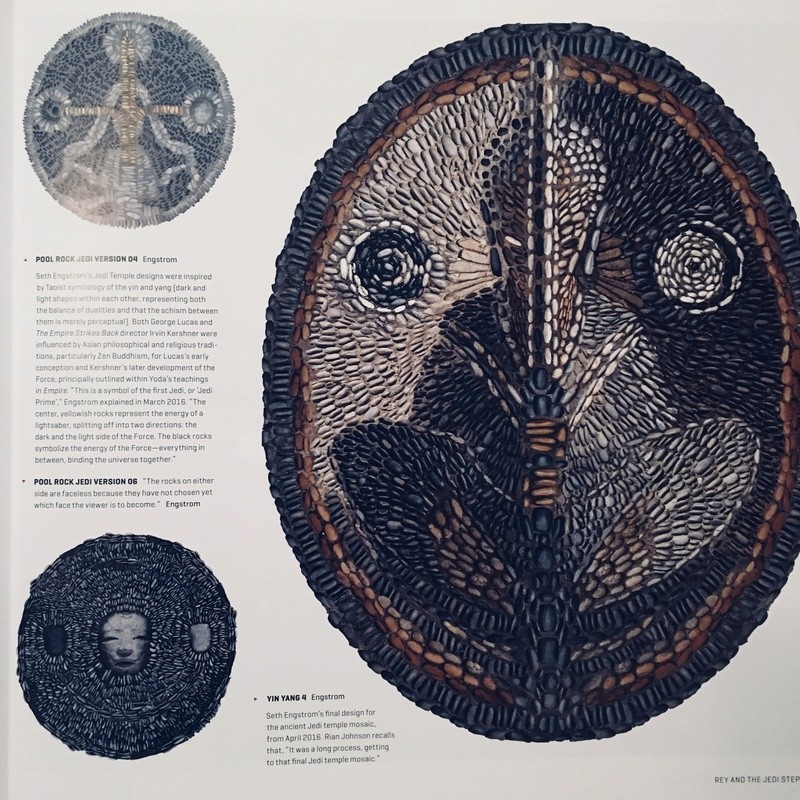The Light isolated on its own is selfless – but also cold and detached.
As a counterpoint, the Dark is selfish – but also emotional and caring.
Anakin, Obi-Wan, & Ahsoka’s presence there triggers the series of events that bring about the most literal portrayal of the prophesy of the Chosen One around Anakin,
which is all directly from George Lucas exploring larger concepts of the Force. It’s Anakin’s trial that shows that managing the balance between the Dark & Light is necessary. It shows that the answer isn’t rejection of one in favor of saving the other, but knowingly exercising CONTROL OVER BOTH.
Brother and Daughter are shown as opposites but also VERY alike –
to be equally as capable for being benevolent and as violent as the other, depending on if the violence or benevolence stems from a selfish or selfless motivator. It’s the Daughter choosing to reveal the weapon sealed in the Altar that tips the conflict past the point of no return and actually brings the Light and Dark against one another directly. Her actions ultimately result in Brother killing her with the very weapon she unlocked when attempting to free himself from Father’s control – filling Brother with even MORE rage and pain. His desire to escape and bring peace and control through power escalates, growing unchecked until eventually the Father chooses to sacrifice himself to eliminate Brother, in order to restore balance.
Also, a VERY important note for the first clip: Father tells Brother, “You’ve done what is forbidden. You’ve chosen the Dark Side and allowed it to feed your anger and desire for power.” Brother’s powers in the Force are not intrinsically evil despite being the opposite from Daughter's.
Echoes of that conflict ripple out throughout the whole galaxy in how events have transpired.
The Jedi originally balanced both Light AND Dark, which we see in the designs of the first Jedi Temple where Luke is:
By the time of the Prophesy in Episode I, the Jedi are already dogmatic. Removing children from their homeworlds, and rejecting attachment and other things that are inherent connections to the Dark, focusing solely on the Light. By the same token, the Sith are then entirely consumed with selfish power.
Exactly HOW that first imbalance came about isn’t clear, but if Mortis gives any hints, the situation itself gave rise to the prophesy about the Chosen One. Additionally, if the Sith separated themselves from the Jedi, it stands to reason that it's both vanity of wanting their own thing, and rejection of one side for another that made the Sith splinter off. Either way, the two sides in opposition of one another was the result.
The Jedi’s interest in Anakin as the chosen one is because he’s the one who’s foretold to destroy the Sith. That’s the Jedi looking at the prophesy as a weapon to destroy the Sith, without addressing how their actions of rejecting half of the Force have caused/perpetuated imbalance in the Force that contribute to the way the Light and Dark manifest against one another.
The Sister is responsible for unlocking the weapon that kills her. Additionally, the ways of the Jedi from the Prequel Era that Luke learned from are shown to be intrinsically interlinked to the rise of the Dark Side against them when he reacts to DESTROY the Darkness in Ben, thus causing the Dark Side to manifest again as Kylo Ren – pitting the Dark and Light against one another, rather than maintaining balance between them.
Anakin succeeds through self-sacrifice, like Father did with Brother. However, Anakin existed as both a Jedi and a Sith in the forms where they were only able to be against one another. Never able to take his place as someone who controlled both.
The sequel trilogy is about that cycle and whether it can be broken or if it’s repeating.















